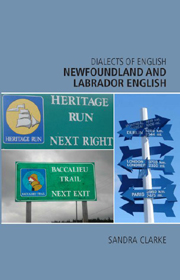6 - Survey of previous work
Published online by Cambridge University Press: 12 September 2012
Summary
An English-language literature relating to Newfoundland has existed for well over 400 years. Richard Hakluyt the younger (1589) provides an account of sixteenth-century English explorations to the New World, including Newfoundland. The region figures in the documents of sixteenth-century explorers, notably those associated with the 1583 expedition of Sir Humphrey Gilbert, who claimed the island in the name of Queen Elizabeth I (see e.g. Quinn and Cheshire 1972). Early seventeenth-century Newfoundland is represented by the writings of its first English colonisers, among them John Guy of Bristol, who founded the first official colony in 1610, and Sir George Calvert, later Lord Baltimore (see Cell 1982). Mason (1620), in a tract written to promote investment in Newfoundland, contains a favourable description of the land and climate, as well as listings of local flora and fauna. Perhaps the most notable document of this period is the extensive 1620 treatise A Discourse and Discovery of New-found-land by Sir Richard Whitbourne, a Devonshire seaman and fishing merchant. The 1628 Quodlibets of Robert Hayman, former governor of the colony at Bristol's Hope/Harbour Grace, represents the first work of poetry to be written in the New World.
The eighteenth and nineteenth centuries saw the publication of various accounts by visitors to the area (Moyles 1975 represents a highly readable survey of some of the nineteenth-century descriptive literature).
- Type
- Chapter
- Information
- Newfoundland and Labrador English , pp. 157 - 169Publisher: Edinburgh University PressPrint publication year: 2010



